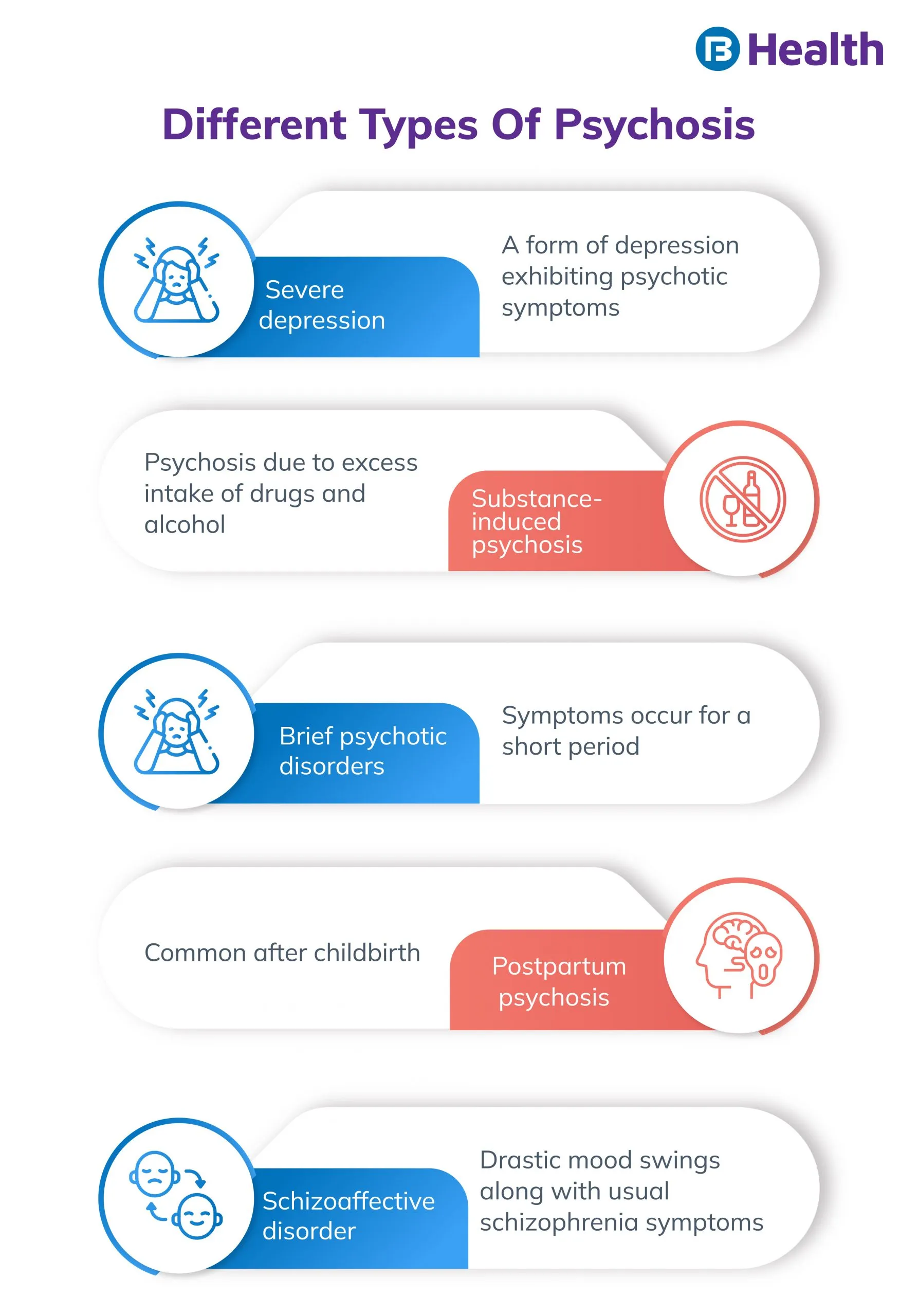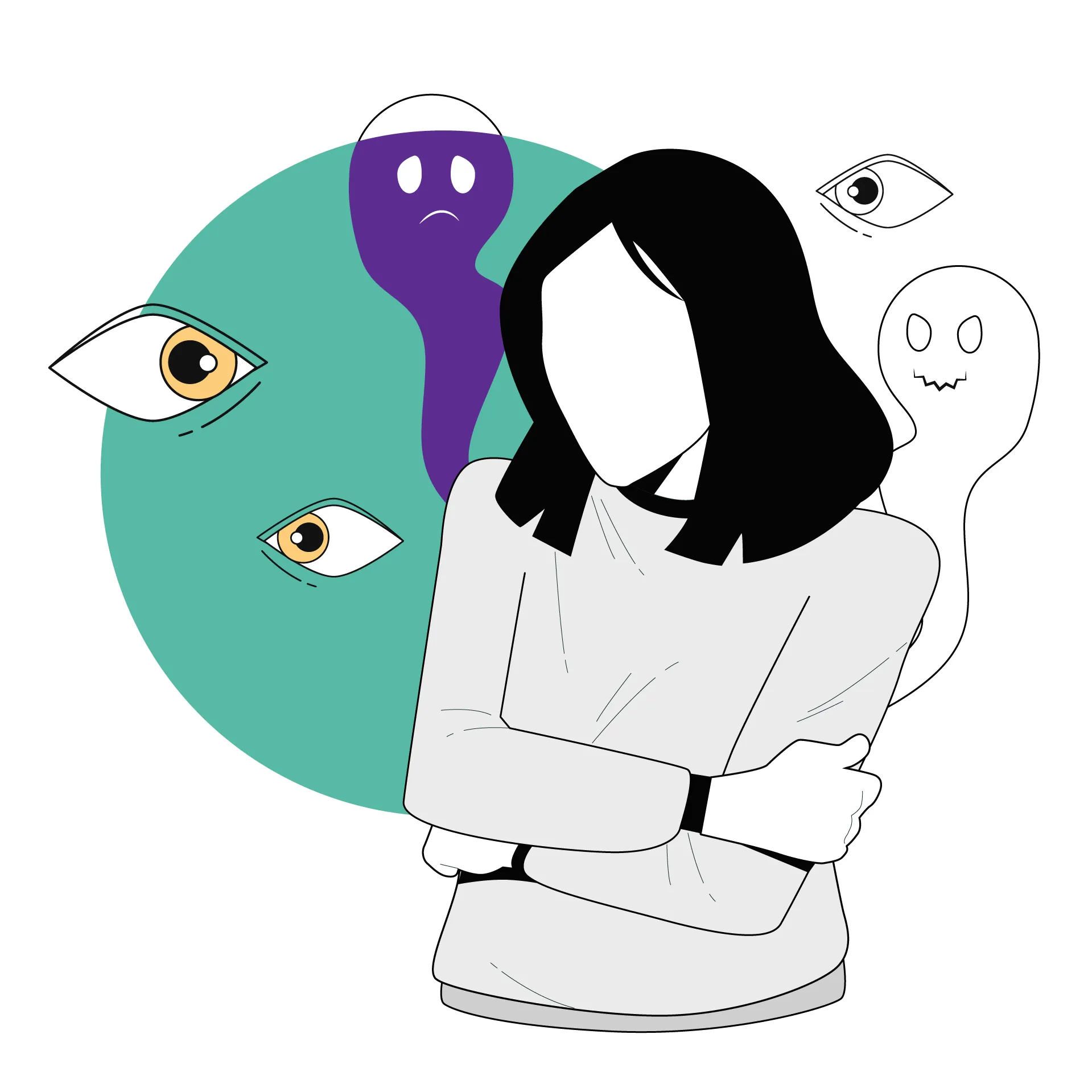Psychiatrist | 6 min read
What is Psychosis: Symptoms, Causes, Diagnosis, and Treatment
Medically reviewed by
Table of Content
Synopsis
Psychosis is a mental condition in which you tend to stay in your own delusional world away from reality. Read to know the exact psychosis definition, psychosis symptoms and how it can be treated.
Key Takeaways
- Psychosis affects the overall mental health of an individual
- Hallucinations and delusions are common psychosis symptoms
- Schizophrenia and bipolar disorder are common psychosis causes
Psychosis is a mental condition in which an individual experiences hallucinations. In psychosis, you tend to stay in a delusional world away from reality. If you observe keenly, you’ll realize that psychosis symptoms are a combination of various factors that affect your relationship with reality. While hallucinations involve sensory processes, delusions affect your cognitive thinking skills. In some cases, you may hear some unusual voices or visualize things that are not rooted in reality. In other cases, your delusional psychosis symptoms may force you to form certain thoughts in the mind that may be contrary to the actual world.
In simple words, the psychosis definition has to do with thoughts and perceptions where you are not able to differentiate the real from the unreal. While it affects your mental well-being, you may not realize that you are experiencing psychosis. You believe everything as per your imagination and fail to understand reality. Psychosis symptoms are seen in individuals suffering from mental illnesses like bipolar disorder and schizophrenia. Though there are many other psychosis causes, individuals with these conditions show psychosis symptoms.
Studies reveal that only about 31.3% of individuals receive proper medical care for psychosis. In fact, 2 out of every three patients are devoid of proper treatment [1]. These facts imply that you should not ignore psychosis symptoms if you observe them in yourself or your loved ones. Remember, mental well-being is vital for good health.
Since there are many overlapping symptoms of psychosis, it may be difficult to diagnose this condition. While it can affect anyone, the prevalence of psychosis in young men is higher when compared to women. Another study hints that 1-3.5% of all individuals show psychosis symptoms.
With appropriate medical care and attention, you can reduce psychosis symptoms. Read on to get an in-depth understanding of psychosis causes, treatment, and psychosis symptoms.
Additional read: Summer Time Mental Health Challenges
Psychosis causes
While mental conditions like schizophrenia can cause psychosis, there may be other psychosis causes too. Each individual may exhibit different psychosis symptoms, so you may not be able to understand the exact cause of this condition. A few common factors linked to psychosis include
- Intake of certain substances and excess alcohol consumption
- Poor sleeping patterns
- Traumatic experiences such as violence or child abuse
- Genetic factors
- Brain injuries
- Excessive levels of anxiety and stress
- Depression
There are medical conditions other than schizophrenia and bipolar disorder that may cause psychosis, such as
- Multiple sclerosis
- Stroke
- Alzheimer’s disease
- Brain infections
- Lupus
- Deficiencies of vitamin B12 and B1
A neurotransmitter called dopamine plays a vital role in this condition. It is a chemical used by the brain to exchange information. Due to psychosis, the function of dopamine is altered, thereby affecting your thinking process.
Additional read: Alzheimer’s DiseasePsychosis symptoms
Now that you are familiar with the psychosis definition, here are a few important symptoms visible in individuals experiencing psychosis. While hallucinations and delusions are the most common signs, watch out for these symptoms so that you can provide proper medical care to your loved ones.
- Speaking in a disoriented and disorganized manner
- Showing unresponsive behavior
- Exhibiting unusual movements like fidgeting or tapping
Monitor the following warning signs that may be seen before the actual condition occurs [2].
- Inability to concentrate properly
- Dislike when it comes to grooming oneself
- Reduced performance levels at work or school
- Inability to think clearly
- Devoid of any feelings
- Inability to take an initiative
- Suspicious behavior
- Increased anxiety levels
While auditory hallucinations appear to be one of the most common psychosis symptoms, they may result in self-injury when overlooked. Hearing imaginary voices may affect behavior that may result in self-harm. If you do not provide proper psychosis treatment, it can even lead to suicide. When your loved ones experience psychosis, they become delusional.
These delusions are mostly paranoid, which may force them to suspect everything and everyone around them. With proper medical attention, you may be able to reduce these delusional thoughts.

Psychosis diagnosis
This condition is diagnosed with the help of a psychiatric evaluation. Your doctor may monitor your behavior and assess you by asking certain questions. If psychosis has occurred due to a medical condition, you may have to undergo an X-ray and other medical tests. If your doctor notices aloofness in your behavior or drastic mood swings, he may ask you certain questions to understand your condition better.
While there are biological tests to determine psychosis, your doctor may analyze your behavior closely and understand if there is a family history of mental illnesses. Blood tests and EEG also help in understanding if psychosis is the cause of any underlying health ailment. With the help of an EEG, a doctor is able to understand the functioning of your brain. With accurate diagnosis and treatment, you can prevent the relapse of mental illness. This is important for your mental well-being.
Psychosis treatment
While psychosis can affect your overall health, timely treatment can help you manage the condition. One of the most common treatment techniques is the intake of antipsychotic drugs. These drugs, however, cannot cure psychosis permanently. By taking these drugs, your psychosis symptoms may reduce. It is important to take these drugs only under proper medical guidance.
If your loved one is showing severe psychosis symptoms, hospitalization is required. This is needed only if it is required to calm your loved one immediately and reduce the risk of self-harm. Such a treatment method is known as rapid tranquilization. Another treatment method known as behavioral therapy can help in managing the symptoms of psychosis.
Now that you are aware of the psychosis definition, treatment, symptoms, and psychotic causes, remember not to neglect the early warning signs. Adopt simple remedies like leading an active lifestyle and practicing yoga and meditation. These minor changes can help you reduce stress and anxiety. After all, these are the main reasons for disturbed mental health.
If you experience any mental health issues, feel free to talk to renowned psychiatrists and psychologists on Bajaj Finserv Health. Book an online appointment either using the app or by visiting the website. With a diverse range of specialists on the panel, you can choose your preferred doctor within minutes. Meet them in person or via video consultation and address all your symptoms. Timely treatment can nip any illness in its bud!
References
- https://www.who.int/news-room/fact-sheets/detail/schizophrenia
- https://www.nimh.nih.gov/health/publications/understanding-psychosis
Disclaimer
Please note that this article is solely meant for informational purposes and Bajaj Finserv Health Limited (“BFHL”) does not shoulder any responsibility of the views/advice/information expressed/given by the writer/reviewer/originator. This article should not be considered as a substitute for any medical advice, diagnosis or treatment. Always consult with your trusted physician/qualified healthcare professional to evaluate your medical condition. The above article has been reviewed by a qualified doctor and BFHL is not responsible for any damages for any information or services provided by any third party.



